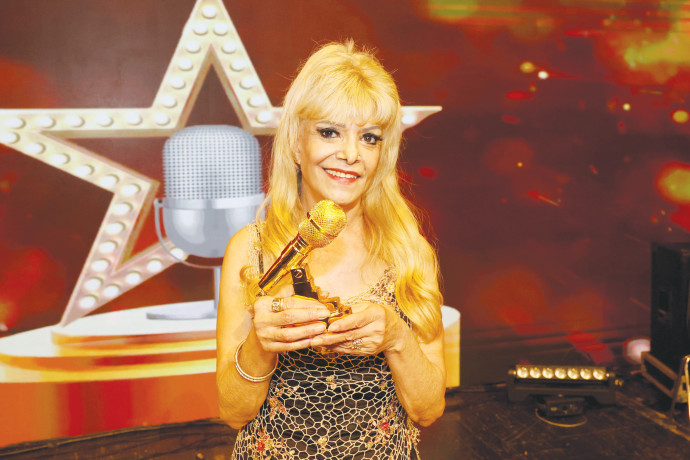Say what you will about baby boomers, they know how to have a good time.
The fifth annual Tel Aviv Star of the City competition, which took place last week, showcased a group of talented amateur singers in their golden years still seeking their moment of glory.
The friendly competition is styled after Israel’s hit American Idol-style show, Kochav Nolad (A Star is Born), but rather than young, naive hopefuls, all of Star of the City’s contestants were retirees.
Some, like Harel Moshe, signed up for the competition on a whim. Others, like the eventual winner Zehava Gadasi, were intent on fulfilling a lifelong dream. For all, it was a night to remember.
Organized and promoted by Tel Aviv-Jaffa Municipality’s Performance division, the physical powerhouse behind the event is creative director Yehuda Hager, who personally prepared each of the contestants and organized the evening’s events.

At the outset of the evening, Tel Aviv mayor Ron Huldai, himself approaching 80, got on stage to say a few words before the performances.
Meet the contestants
Each of the 10 contestants was excellent in its own right, but four, in particular, stood out. Ariella Raz-Strousburg sang Geula Gil’s 1964 ballad, “Talk to Me with Flowers” and brought the house down. During her performance, her husband approached the stage to sweetly give her a bouquet of flowers. Her strong, soulful voice struck a deeply emotional chord with the audience.
Shmuel Levine, who is from Jerusalem and lived in Florida for 30 years, sang the evening’s only song in English – The Animals’ “House of the Rising Sun.” The song choice, inspired by Levine’s chance meeting several years ago with The Animals’ vocalist Eric Burdon, was perfect for his deep gravelly voice.
Harel Moshe, a career radio personality who also leads Jeep tours worldwide, only heard about the competition by chance and signed up on a whim. He sang Arik Einshtein’s 1984 hit, “Od Nipagesh” (We Will Meet Again), which the crowd loved and earned him second place overall.
ZEHAVA GADASI was very at home on the stage. Born to a traditional Yemenite family, which she described as “good people but... antiquated,” Gadasi was prevented from pursuing her talents at a young age. She had wanted to enroll at the Inbal Dance Theater at age eight but her father forbade it.
At 14, she and her older brother – Rami Danoch of the band Sounds of the Oud, who is sometimes credited with helping bring mizrahi music into the Israeli mainstream – auditioned for and highly impressed Bezalel Aloni (famously the producer and manager for Ofra Haza), but Gadasi’s father again stopped her from following that path.
“I feel like I missed out,” she told The Jerusalem Post.
“I started everything relatively late in life, so I do feel some kind of loss. But I am thankful for what I have... That’s how life turned out.”
“I started everything relatively late in life, so I do feel some kind of loss. But I am thankful for what I have... That’s how life turned out.”
Zehava Gadasi
She married at 18, at which point she had slightly more freedom to pursue the performing arts and was briefly able to tap into her talent for singing. She traveled to America for the Bicentennial in 1976 as a dancer with a delegation of Israeli performers.
At one show in Los Angeles, she was asked to sing last minute. “I didn’t believe what happened there,” Gadasi told the Post, “the next day I was in all the newspapers.”
Returning to Israel, Gadasi started a family and again put performing on the back burner. Then she had what she describes as a crisis at age 45 and decided to make a big change. “I decided to reinvent myself from scratch,” she said.
She began to go along with her brother to performances and graduated to perform herself, which she generally does on weekends so she can devote the weekdays to the children and grandchildren.
Gadasi’s performance, which earned her first place, was stellar from beginning to end. She came on stage dressed like a rock star in a tank top and skinny jeans resplendent with sparkles and a huge smile. She sang “You” by Eyal Golan, and completely rocked it, hitting every note with ease and precision. She radiated joy and confidence; it is no wonder she came out on top.
While the judges deliberated, the audience was treated to a performance from “Lehakat Hazahav,” also directed by Yehuda Hager. The choir, made up of Tel Avivians in their golden years, sang “Ayelet Ahavim,” written by Naomi Shemer in 1965 for the Yarkon Bridge Trio. Then, the group Sloshteinu hopped on stage for a rousing set after the more dulcet tones of “Ayelet Ahavim.”
Finally, the winners were announced, with Gadasi gaining the top spot.
Until that evening, it had not particularly occurred to me that anyone would be doubting the ability of retirees to put on an excellent show. And I can confidently say that any preconceived notions I might have had were blown out of the water by Star of the City and its wonderfully spirited contestants. I can’t wait to go back next year.
